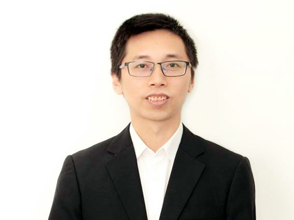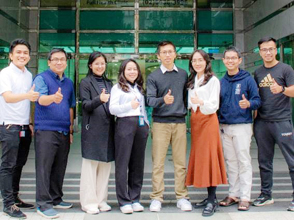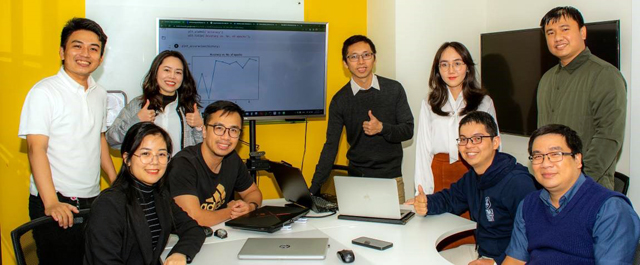我是黎阮國慶又名Khanh Lee,臺北醫學大學醫學院人工智慧醫療碩士在職專班的助理教授,在加入臺北醫學大學之前,我在新加坡南洋理工大學完成博士後研究,我在臺灣元智大學資訊工程系獲得碩士和博士學位,作為一名專門從事醫學應用的電腦科學家和數據科學家,我主要目標是為人工智慧(AI)領域及其在醫學中的應用做出貢獻,我的研究聚焦在應用人工智慧於影像組學、生物資訊學和生物醫學資訊學,目標是推動醫學影像和基因體學,使用人工智慧預測和診斷疾病,並改善患者治療效果。
 為了實現這些目標,我成立AIBioMed團隊,該團隊由來自人工智慧、醫學和技術等各個不同領域的專家所組成,熱衷於採用跨學科方法從不同角度解決複雜問題。在我的帶領和AIBioMed團隊的專業知識,我們已經為該領域做出重大貢獻,在頂尖期刊上發表各種論文,並在國際會議上展示各種研究成果,此外,我們還獲得中華民國國家科學及技術委員會(NSTC)和教育部的多項研究資助,最近,我們處於開發創新解決方案的最前線,這些解決方案有可能徹底改變醫療保健,我們致力於促進人工智慧在醫學中的應用,這突顯我們致力於改善患者治療效果和促進醫學知識的承諾。有關我們工作的更多資訊,可參考:http://aibiomed.tmu.edu.tw/。【右圖:臺北醫學大學醫學院人工智慧醫療碩士在職專班外籍教師黎阮國慶助理教授】
為了實現這些目標,我成立AIBioMed團隊,該團隊由來自人工智慧、醫學和技術等各個不同領域的專家所組成,熱衷於採用跨學科方法從不同角度解決複雜問題。在我的帶領和AIBioMed團隊的專業知識,我們已經為該領域做出重大貢獻,在頂尖期刊上發表各種論文,並在國際會議上展示各種研究成果,此外,我們還獲得中華民國國家科學及技術委員會(NSTC)和教育部的多項研究資助,最近,我們處於開發創新解決方案的最前線,這些解決方案有可能徹底改變醫療保健,我們致力於促進人工智慧在醫學中的應用,這突顯我們致力於改善患者治療效果和促進醫學知識的承諾。有關我們工作的更多資訊,可參考:http://aibiomed.tmu.edu.tw/。【右圖:臺北醫學大學醫學院人工智慧醫療碩士在職專班外籍教師黎阮國慶助理教授】
我們的研究主要集中在兩個主要應用:影像組學和基因組學。影像組學是個讓人興奮且發展迅速的醫學研究領域,涉及從醫學圖像(如電腦斷層掃描、磁振造影和正子斷層掃描)中提取和分析大量定量資料,影像組學研究的目標是透過識別肉眼看不到的模式和特徵,利用這些數據改進如癌症等疾病的診斷、預後和治療。
 我們專注於開發用於圖像分析的新演算法和模型,這些演算法和模型能夠識別與特定疾病或結果有關聯之醫學圖像的相關特徵。此外,我們的目標是將影像組學數據與其他類型的數據整合,例如基因組學、臨床和人口統計數據,以改善疾病進程和治療結果,因此,影像組學有潛力透過提高疾病診斷、治療的準確性,和有效性徹底改變醫學領域。【左圖:黎阮國慶助理教授(右4)與AIBioMed團隊成員合影】
我們專注於開發用於圖像分析的新演算法和模型,這些演算法和模型能夠識別與特定疾病或結果有關聯之醫學圖像的相關特徵。此外,我們的目標是將影像組學數據與其他類型的數據整合,例如基因組學、臨床和人口統計數據,以改善疾病進程和治療結果,因此,影像組學有潛力透過提高疾病診斷、治療的準確性,和有效性徹底改變醫學領域。【左圖:黎阮國慶助理教授(右4)與AIBioMed團隊成員合影】
在基因組學和生物資訊學領域,我們使用機器學習、深度學習和自然語言處理(NLP)等人工智慧技術,幫助研究人員從大量基因組學和生物數據中洞察有意義的資訊。在基因組學中,人工智慧用於分析和解釋大型遺傳資訊數據集,識別與特定疾病(如癌症)有關聯的基因組數據中的模式和相關性。在生物資訊學中,人工智慧技術可用於分析和解釋生物資訊的大型數據集,例如蛋白質結構、基因表達水平和代謝途徑。我們專注於整合和分析這些不同類型的數據,以便更全面了解生物系統和疾病機制。
展望未來,AIBioMed團隊將繼續推動以人工智慧為基礎的影像組學和基因組學模型方面的研究,以完成更高階段的任務,影像組學和基因組學將在精準醫療中發揮越來越重要的角色,根據患者特性為他們量身定制治療方案,隨著更多數據可用,及人工智慧技術不斷發展,影像組學和基因組學將提供越來越強而有力的工具來支持精準醫療和改善患者治療效果,人工智慧在基因組學和生物資訊學領域的未來依舊讓人感到興奮,人工智慧有巨大的潛力改變我們所理解和治療疾病的方式,最後,我們希望看到更準確的預測、更個人化的治療方案並為患者帶來更好的治療效果。(文/黎阮國慶,醫學院人工智慧醫療碩士在職專助理教授)【左圖:黎阮國慶助理教授(後排中)與研究團隊合影】
I am Le Nguyen Quoc Khanh, also known as Khanh Lee. I am an assistant professor with the Professional Master Program in Artificial Intelligence in Medicine, College of Medicine, Taipei Medical University (TMU). Prior to joining TMU, I completed a postdoctoral research program at Nanyang Technological University in Singapore. I earned my master’s and Ph.D. degrees from the Department of Computer Science and Engineering, Yuan Ze University, Taiwan. As a computer scientist and data scientist specializing in medical applications, my primary goal is to contribute to the field of artificial intelligence (AI) and its applications in medicine. My research interests are focused on AI applied to radiomics, bioinformatics, and biomedical informatics, with the goal of advancing medical imaging and genomics, using AI to predict and diagnose diseases, and improve patient outcomes.
To achieve these goals, I founded the AIBioMed team, a diverse group of experts from various fields, including AI, medicine, and technology. Our team is passionate about using an interdisciplinary approach to tackle complex problems from different perspectives. With my leadership and the AIBioMed team’s expertise, we have already made significant contributions to the field, publishing numerous papers in top-tier journals and presenting a variety of research at international conferences. Additionally, we have been awarded several research grants from the National Science and Technology Council (NSTC) and the Ministry of Education (MOE) in Taiwan. Recently, we are at the forefront of developing innovative solutions that have the potential to revolutionize healthcare. Our commitment to advancing the use of AI in medicine underscores our dedication to improving patient outcomes and advancing medical knowledge. Further information about our work can be found at http://aibiomed.tmu.edu.tw/.
Our research is centered around two primary applications: radiomics and genomics. Radiomics is an exciting and rapidly evolving field of medical research that involves extracting and analyzing large amounts of quantitative data from medical images, such as CT scans, MRIs, and PET scans. The goal of radiomics research is to use this data to improve the diagnosis, prognosis, and treatment of diseases, such as cancer, by identifying patterns and features that are not visible to the naked eye.
We are focused on developing new algorithms and models for image analysis that can identify relevant features in medical images that are associated with specific diseases or outcomes. Additionally, we aim to integrate radiomics data with other types of data, such as genomics, clinical, and demographic data, to improve disease progression and treatment outcomes. As a result, radiomics has the potential to revolutionize the field of medicine by improving the accuracy and effectiveness of disease diagnosis and treatment.
In genomics and bioinformatics, we use AI techniques, such as machine learning, deep learning, and natural language processing (NLP), to help researchers extract meaningful insights from vast amounts of genomic and biological data. In genomics, AI is used to analyze and interpret large datasets of genetic information, identifying patterns and correlations in genomic data that are associated with specific diseases, such as cancer. In bioinformatics, AI techniques can be used to analyze and interpret large datasets of biological information, such as protein structures, gene expression levels, and metabolic pathways. We are focused on integrating and analyzing these different types of data to provide a more comprehensive understanding of biological systems and disease mechanisms.
Moving forward, the AIBioMed team will continue to drive our research in AI-based radiomics and genomics models to high-level tasks. Radiomics and genomics will play an increasingly important role in precision medicine, where treatments are tailored to individual patients based on their unique characteristics. As more data becomes available, and AI techniques continue to evolve, radiomics and genomics will provide increasingly powerful tools to support precision medicine and improve patient outcomes. The future of AI in genomics and bioinformatics is still exciting, and there is enormous potential for AI to transform the way we understand and treat diseases. To the end, we expect to see more accurate predictions, more personalized treatments, and better outcomes for patients.

